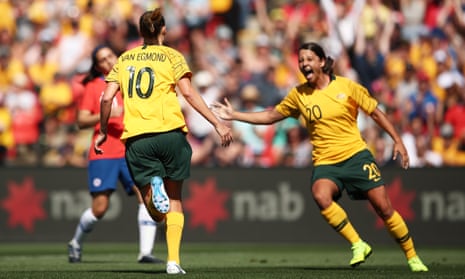The world-beating sisters of Australian sport aren’t just doing it for themselves; they are connecting with fans in a way men’s teams can only dream of. A study of sports fans has found women’s teams – specifically the rugby sevens national side, the Matildas, the Diamonds and the Opals – rank highest with the public for emotional connection and trust.
Researchers found that while high-profile men’s sports teams may have more fans overall, women’s teams actually rate much better in terms of respect, enjoyment, trust, pride and bond among those familiar with them.
“We found trust overall was very strong with women’s teams,” says Georgie Maynard, director of True North Research. “Can you think of an occasion where there has been a controversy or big negative issue to do with one of those women’s teams? We simply don’t see those incidences in women’s sport – while they are seen more extensively in male sport.”
Those four teams in particular are stacked high with humble, hard-working role models and given women’s sport rarely, if ever, hits the headlines for the wrong reasons – no clandestine supplement regimes, no sexting scandals, no sexual assault allegations, no Mad Monday nakedness – it is hardly surprising that feelings of trust are referred to women’s teams.
The “emotional connectedness” revealed in the report – which ranks 15 national sides and 47 winter teams from AFL, NRL, netball and rugby – is another plank in the platform women’s sports have been building in recent years; on a foundation of performance, humility and authenticity.
That the top four places in the rankings went to female national sides suggests the oft-cited “baby steps” being taken by women’s sport could soon become confident strides.
Quick GuideEvaluating emotional connection to sports teams
Show
Emotional connection ladder
- Women's rugby sevens (Australia)
- Women's football (Matildas)
- Netball (Diamonds)
- Women's basketball (Opals)
- Men's rugby league (Kangaroos)
Trusted to uphold integrity
- Women's football (Matildas)
- Netball (Diamonds)
- Women's rugby sevens (Australia)
- Women's basketball (Opals)
- Men's football (Socceroos)
Proud to be a fan of
- Netball (Diamonds)
- Women's football (Matildas)
- Women's rugby sevens (Australia)
- Women's basketball (Opals)
- Men's basketball (Boomers)
Least trusted to uphold integrity
- Essendon (AFL)
- Canterbury Bulldogs (NRL)
- Men’s cricket Test team
- Manly Sea Eagles (NRL)
- Cronulla Sharks (NRL)
(True North Research: BenchMark 2018)
On the 62-strong list, the national men’s rugby league, basketball and football teams fill positions five through seven. Queensland’s two Super Netball teams, the Firebirds and Sunshine Coast Lightning, rank eighth and 11th respectively – both higher than the faltering Wallabies (16), the men’s Test cricket side (22) and every AFL team.
The national women’s cricketers, who at the weekend won the World T20 title in Antigua, managed 14th, but the survey was undertaken more than a month before that high-profile victory. “With their success and increased visibility, we’d expect to see a stronger emotional connection in future reports,” Maynard says.
Also of note, the Super Netball franchise aligned with AFL behemoth Collingwood scraped into 57th spot, the worst-performing female side by about 30 places and the only women’s team rated “below par”.
When asked specifically which team they were “most proud to be a fan of”, the Diamonds rank No 1, the Matildas second, women’s rugby sevens third and the Opals fourth. Men’s basketballers, the Boomers, came in fifth.
The team most “trusted to uphold the integrity of the sport” featured the same top four, with the Socceroos rounding out the top five. In the same category, at the bottom end of the scale the list was exclusively male. AFL club Essendon – which was embroiled in a supplements scandal for several seasons – topped the “least” list, followed by the NRL club Canterbury Bulldogs, and the men’s Test cricket team, which is still dealing with the fallout from the ball-tampering scandal. Two other NRL sides, Manly Sea Eagles and Cronulla Sharks, were fourth and fifth.
But why do emotions matter? Because, Maynard says, they drive outcomes, affect long-term advancement and protect a sport or team when in crisis. To teams, rights holders and sponsors, they’re as relevant as outcome-based measures like attendance, TV ratings and memberships.
“Sport fandom is emotional,” she says. “A team’s score looks beyond behavioural outcomes. It examines the very heart of the relationship between a sports property and sports fans and uncovers the drivers of emotional connection. This then enables teams to engage a larger audience and create more loyal fans.”
The report – which will be repeated early next year to evaluate AFLW, basketball, cricket and football teams – also provides insights around sponsorship and the financial implications of harnessing this potentially lucrative connection.
And if the best women’s teams in Australia can tap into the passion they provoke, they will edge one step closer to finally levelling the playing field – where it’s not women’s sport at all, just sport.

Comments (…)
Sign in or create your Guardian account to join the discussion